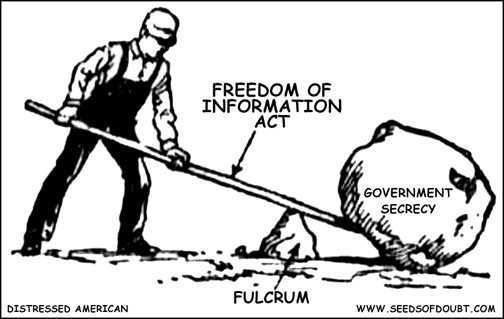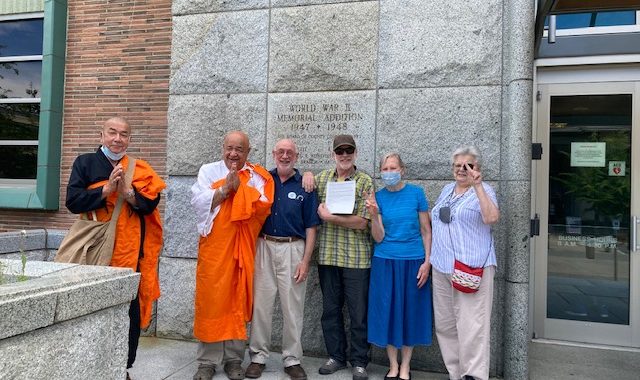Editor’s Note: The United States Government continues to erect huge walls of secrecy (in the name National Security and its endless war on terror), preventing the public from (among other things) exercising our right to know about issues that affect our health and safety.
Glen Milner has been a constant advocate for our right to know, and won a significant victory in the US Supreme Court in 2011 – Milner v. Department of the Navy. Milner had requested (through FOIA) explosives data and maps to determine the risk to neighbors of a Navy munitions storage depot in case of an accident involving explosives handling. The Navy refused to supply the requested information stating that disclosure would threaten the security of the base and (ironically) the surrounding community based on one of the nine exemptions allowed by FOIA. In an 8 to 1 decision, after much legal wrangling in the circuit courts, the Supreme Court ruled that the information requested could not be withheld based on the Navy’s claim of exemption.
This article from Steven Aftergood’s Secrecy Blog is a reminder that if the Department of Defense (DoD) does not like a decision (in this case by the Supreme Court), it will go to any lengths to render it null and void. Beyond that, the Department of Justice is providing the lead for a broad exemption for the DoD as is being experienced in Kitsap County. The Navy, through the U.S. Attorney’s office, recently threatened to criminally charge Kitsap County attorneys/prosecutors if they release information regarding emergency response plans for Naval Base Kitsap-Bangor.
DOD SEEKS FOIA EXEMPTION FOR MILITARY DOCTRINE
From the Federation of American Scientists (FAS) Project on Government Secrecy
Volume 2016, Issue No. 2
January 6, 2016
Secrecy News Blog: http://fas.org/blogs/secrecy
The Department of Defense proposed a new exemption from the Freedom of Information Act last year for information on unclassified “military tactics, techniques and procedures.” The measure was not adopted by Congress in the FY 2016 defense authorization act, but DoD is preparing to pursue it again this year.
The proposal that was submitted to Congress last year would have exempted from disclosure military doctrine that “could reasonably be expected to risk impairment of the effective operation of the armed forces” and that had not already been publicly disclosed.
“The effectiveness of any United States military operation is dependent upon the enemy not having knowledge of how U.S. military forces will be used,” DoD stated in its justification for the exemption. “Commanders need to have all advantages at their disposal to be successful on the battlefield; if the enemy has knowledge of the tactics, techniques, or procedures that will be used, a crucial advantage is lost and success of the operation and the lives of U.S. military forces are seriously jeopardized.”
DoD claimed that it would have been able to exercise this withholding authority until 2011, when a Supreme Court ruling in the case Milner v. Department of the Navy “significantly narrowed” the scope of FOIA Exemption 2. “This proposal would reinstate that protection to ensure effective operation of U.S. military forces and to save lives.”Watch Full Movie Online Streaming Online and Download
The first thing to say about the proposed DoD FOIA exemption is that, given the realities of government information security today, any prudent military commander would have to assume that the adversary already possesses the unclassified military doctrine documents that the exemption would protect from public disclosure. The government has repeatedly been unable to protect many types of information of much higher sensitivity.
If that were not the case, the proposed DoD exemption would make sense up to a point. But it stops making sense where DoD “tactics, techniques and procedures” are themselves the focus of appropriate public attention. For example, U.S. techniques for the interrogation of detained persons have been the subject of intense public controversy as to whether they are illegal or inhumane. Likewise, offensive cyber operations involve important public policy questions that go beyond the tactical interests of the military. The DoD proposal does not appear to make allowance for mandatory FOIA disclosure in such compelling cases.
In another even more ambitious proposed FOIA amendment, DoD last year sought to nullify the 2011 Supreme Court decision in Milner altogether, and to reinstate the pre-Milner status quo with its more expansive withholding authority.
“The effect of the decision in Milner is that it exposes for public release certain critical information previously interpreted as being exempt from disclosure under the ‘High 2’ exemption,” the DoD proposal explained. “The Administration believes that, following the Supreme Court’s decision, there is a critical gap in the exemptions in the current FOIA statute. This proposal is designed to close that critical gap.”
Both DoD FOIA proposals — the specific exemption for unclassified tactics, techniques and procedures, and the broad nullification of the Milner decision — were excluded by Congress from the FY 2016 defense authorization act “due to jurisdictional concerns and process issues (but not content issues),” according to an internal DoD planning document.
But both are expected to be presented again this year. DoD will advance its proposed FOIA exemption for military doctrine, while the proposed Milner amendment, with its government-wide implications, has been transferred to the Department of Justice for separate submission to Congress.




